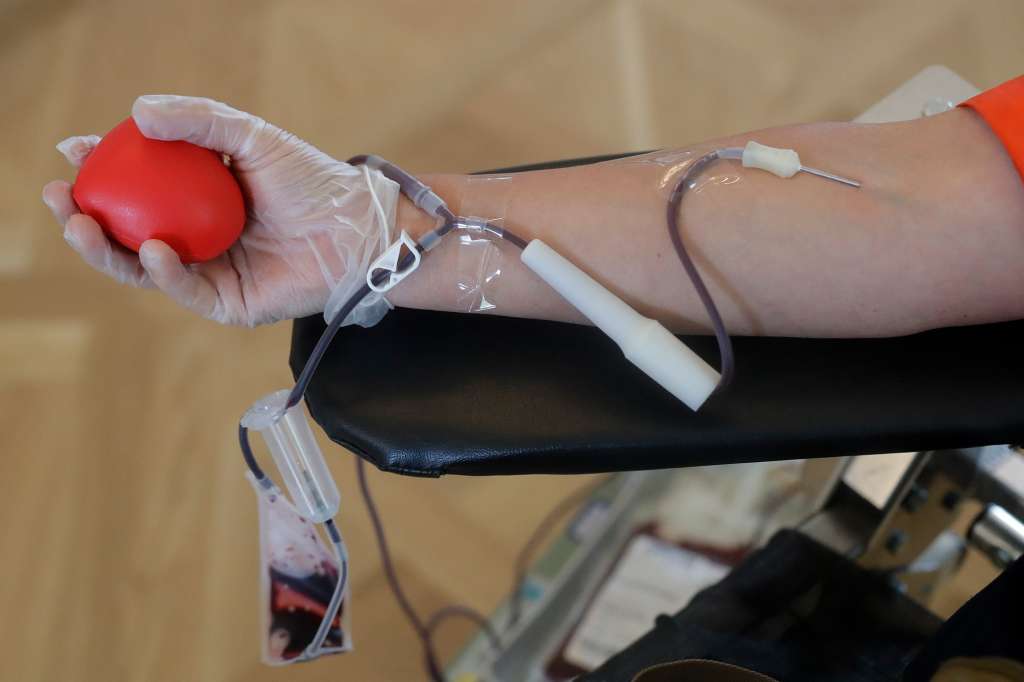(CNN) — The US Food and Drug Administration issued new blood donation eligibility guidance Thursday as US blood supplies decrease amid the coronavirus pandemic. The changes are to be implemented immediately and are expected to remain in place after the pandemic ends.
The FDA has guidelines in place to reduce the risk of transmitting HIV through blood, and is shortening its recommended blood donation deferral period for some groups: For male donors who have had sex with another man, female donors who would have been deferred for having sex with a man who had sex with another man and for those who recently got tattoos or piercings, the recommended blood donation deferral period changes from 12 months to three months.
US Surgeon General Jerome Adams said in a media briefing following the release of the new guidelines that HIV-positive people are still barred from giving blood.
But those taking taking a pre-exposure prophylaxis, or PrEP, to prevent HIV infection can still donate if they’re not using the medication to treat HIV infection, said Dr. Peter Marks, the FDA’s director of the Center for Biologics and Evaluation Research, who participated in the briefing.
Whether they need to discontinue the use of the medication and for how long is up to the donation center, he said.
“The individual donor centers will have policies that may require that someone stop those medicines for a period of time, but that, that is something that is generally left to the discretion of the donor centers,” Marks said.
The FDA is also making changes to its blood donation guidelines for people who have traveled to countries where malaria is endemic — the recommended deferral period changes from 12 months to 3 months.
And for people who spent time in European countries or military bases where there was risk of transmission of Creutzfeldt-Jakob disease or variant Creutzfeldt-Jakob disease, the agency is eliminating recommended deferrals.
Increasing blood donations
The FDA said there is an “urgent” need for blood, blood products and plasma, and waived the standard public comment period in issuing the new guidance, but said blood donation centers are not required to implement these changes.
“We expect that the updated guidance and alternative procedures will help increase the number of donations moving forward, while helping to ensure adequate protections for donor health and maintaining a safe blood supply for patients,” according to a statement Marks out out before the media briefing.
“People who donate blood are part of our critical infrastructure industries. More donations are needed at this time and we hope people will continue to take the time to donate blood,” he said.
Marks later emphasized in the briefing that coronavirus is a respiratory illness and, like the flu, is not generally transmitted by blood.
“The concern is not about passing the virus by transfusion. The concern would be about other donors in the donor center.”
American Red Cross safety practices
“Social distancing does not mean social disengagement,” Adams said Thursday, addressing the issue in the briefing. “Maintaining our nation’s blood supply is always critical but especially now as donations drastically drop.”
The American Red Cross is assuring donors that it’s safe to give blood at local centers during the pandemic and that it’s just as crucial to community health as going to the grocery store or pharmacy.
“We should all practice social distancing, but it’s important to know that blood drives are not considered “mass gatherings” because they are controlled events with trained staff and appropriate safety measures to protect donors and recipients,” the agency said on its website.
The agency said each Red Cross donation center has taken steps to insure donor safety and infection control practices are in place, including temperature checks on staff and donors, hand sanitizing before and during the blood donation process, social distancing between donors and regular disinfection of surfaces and equipment.
The-CNN-Wire™ & © 2024 Cable News Network, Inc., a Time Warner Company. All rights reserved.

